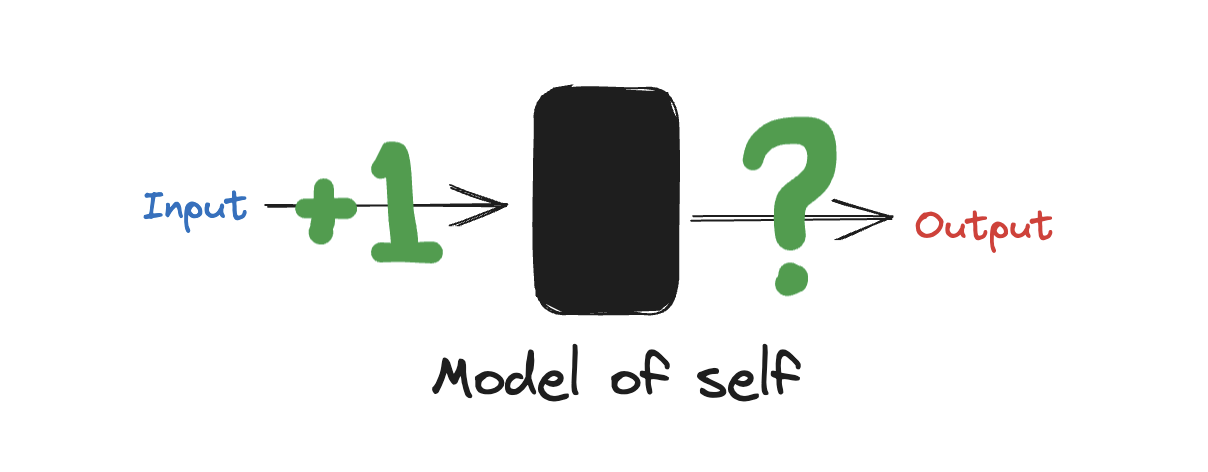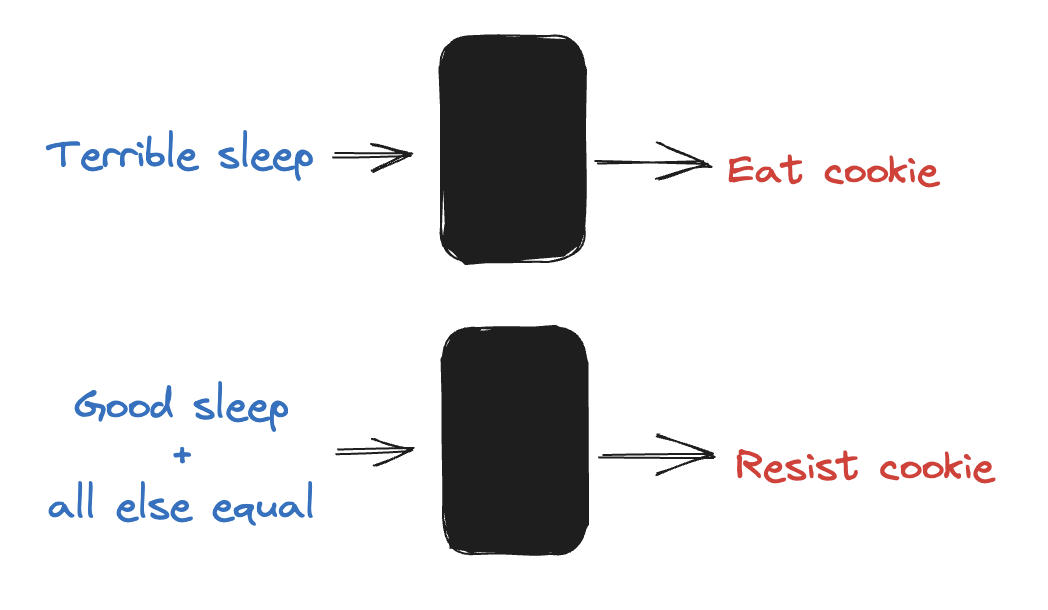An Empirical Method for Self Nurture
Mistake
‘I won’t eat the cookie’, he told himself. He ate one yesterday; but he wasn’t supposed to.
‘But that was yesterday. Today is a new day.’ He was ashamed, but optimistic.
‘All I have to do is to not put that cookie in my mouth.’ It sounds so simple to do.
‘Just follow the rule – no eating after dinner.’

When we make a mistake, we often look back on it with shame and guilt. Imagining our self as the same person that made the mistake is painful; it invokes disgust. It’s incongruent with our model of self and therefore it’s more convenient to discard the evidence as an outlier. This allows us to retain our ideal self image that we believe is necessary to confront difficult situations of the emergent future. If we concede to our weakness, won’t that mean that the self will succumb to the same weakness going forward?
For fun: Patrice O’Neal
Analytical Reform
If the mistake was simple, then so, too – must be its solution? Now me is rational, because I am now thinking about the bad decision. So if it was the wrong decision, then simply:
- Imagine a better version of self in the future
- Preemptively decide on its behalf
- Assign it forward to future me
Now all that is left is to follow the plan. Problem solved, right? Only if this works. Then all of us could have six packs in six weeks.

When it comes time to obey the orders of our past selves, should you expect yourself to comply to a lesser version of you in the past, who is powerless to travel to the future present to coerce you into action? If resisting the cookie didn’t work last time given the same circumstance, why is it OK to expect different results next time?
This doesn’t work: To reform the deciding self, shame the past self and conceive a vision of a better future self. Then what’s the alternative? To employ more willpower? To be more motivated towards my goal with rewards? A different way to think about it?
Self Nurture
I recognize that the cookie example is absurdly simple, but the general problem is complex and persistent. So much so that confronting it is a biblical virtue. It’s known as self control. How often have you made a personal commitment to yourself, only to back out of it? How many variations of promises did you make to yourself, hoping to reap its benefits? What habits do you know is good for you, yet do not do them regularly? I’m in my thirties and still struggling with habits, good and bad. I eat cookies when I shouldn’t, and not work out when I should. When I was 20, I had a vision of who I would become by 30: I’m not even half way there.
As with any other complex system, our response is to project its nature onto a model, pruning inessential qualities. The model we choose for self governance is cultural and inherited. Like parent / like child, we command as taught.
The Spirit produces love, joy, peace, … and self-control
– Galatians 5:22-23
The words self control implies a kind of discipline and willpower. It’s as if you need to consolidate multiple versions of yourself across past, present, and future; and that you need to impose strict consistency between decider, actor, and observer. But the simplistic approach of ‘do it and don’t not do it’ is proven not to work. We are not computer programs and we override our past selves with each passing moment.

There are many models for modeling self behaviour. Religious, psychological, economic, philosophical, anthropological, neurohormonal, to name a few. But regardless of which model you employ, it’s not always going to be right. And when it fails, it needs to change. Combining and refining these models is the act of understanding ourselves.
Our model of self is an ever-evolving story of ourselves, that we tell ourselves. And the stories accumulate throughout our lives, sometimes through books and other times through experience. The model is useful to the extent that it is able to predict our own behaviour in any given situation. But our self perception changes with each new experience. Assuming a singular static assumption of who we think we are will cause dissonance between the idea of self and the actual self.
Therefore, we should attune our model of self to our observations of past behaviour. As a corollary, the model can be refined by empirical methods.
The goal is to develop a model that allows for reliable prediction of behaviour when given internal and external states. Then, we can nurture ourselves with confident guesses to which diffs will produce a positive outcome.
Empirical Methods

With analytical methods, theories about the black box are developed and dissected to predict the outcome. It’s what we’re taught at school, in books, and through media. When we engage in therapy or listen to motivational speakers to understand ourselves better, we are seeking understanding through analysis.
With empirical methods, the core idea is much like the scientific method. It relies on experiments and observation to iteratively build our understanding of self. Like a science experiment, trials on self are considered successful if a clear signal is achieved at low cost.

Setting up an experiment requires a hypothesis and a repeatable initial state. The sciencey-ness of an experiment with a population sample of just one may sound dubious, but the sample size can be grown to significance if the behaviour under test does not rely on surprise or skill.
For example, suppose that you are interested in how you’d act when confronted by a robber in your house. Setting up that experiment would not be possible because if you set it up for yourself, it wouldn’t be a surprise; and, you’d be better at self defense with each additional encounter. So there are limitations to primary research on self, but it’s the only way to improve on imperfect models given to us.
Thought experiments are experiments, too. As an adult, you have a bank of experiential memories to draw from. You can try to pick a set of situations that produced one kind of behaviour, and an adjacent set of situations that produced a different behaviour. You can then take the diff of the two sets of inputs, and assign a probable cause to the diff.

For the cookie example, suppose that the days where you were able to resist temptation were ones where you got good sleep the night before, but the days where you couldn’t resist were ones where you were tired and sleep-deprived. Based on that observation, you could reasonably conclude that good sleep made the difference in your cookie decision. So, if you have control over your sleep, you have control over cookies.

To get quality data for such experiments, most variables should be controlled for. That’s why daily routines are so important: to be able to determine the diffs for causality with high confidence.
New Equilibrium
If you were able to predict how you would act in any situation, and you can manipulate your body and immediate environment, what would that enable you to do?
If you could figure out how to sleep well, eat right and exercise each day, then you’d be well on your way to living past 100. Project Blueprint is an attempt to advance humankind as a biological being. The quantity and quality of living hours are reportedlly superior. This is my personal aspiration.
You can plan further into the future and pursue bigger projects, well aligned with your dreams. With foundation of self well-established, you can build multiple careers on top and be more useful than all of your peers. You can make enough money to pursue any meaningful activity.
If you nurture yourself, then failure becomes a learning experience, not a point of shame. It’s a valuable data point anchored in emotion.
I hope that you would reflect and imagine yourself continuallly growing for the rest of your life.